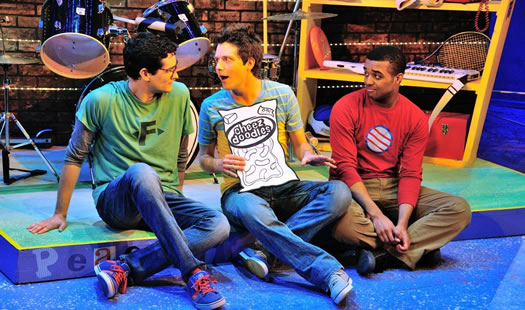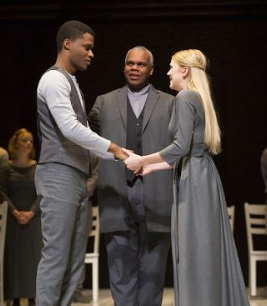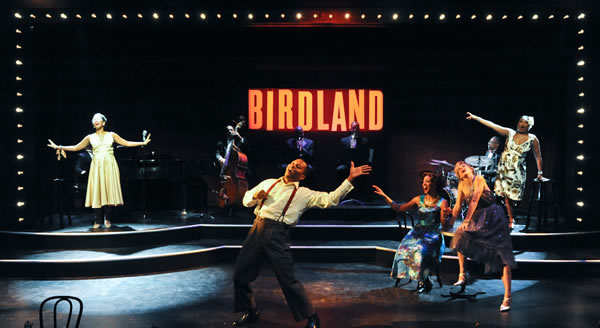|
JACQUELINE LAWTON: Why did you decide to get into theatre? Was there someone or a particular show that inspired you?
DEBBIE MINTER JACKSON: I’ve been a performer (singer, dancer, actress—a rather mediocre triple threat) since college and during my early years in D.C. As an English major, writing about the theater became a natural as auditions and shows dwindled, and now I’m living my bliss – watching all the theater I could possibly want, and writing about it. JL: How long have you lived and worked as a theatre critic in D.C.? What brought you here? Why have you stayed? DMJ: Federal work in Public Health enticed me here from Chicago in 1991, which was great since I’ve been targeting this area for years. It’s a sweet spot between the bustle of NYC’s Broadway and the cultural legacy of the South where I can feel the spirit of ancestors still hovering along valleys and hills. I met my life-partner Bill at Fords Theatre at a discussion on Lincoln, Emancipation and Race. Need I say More??? Plus, this area a treasure trove of cultural events and appreciation for the arts that one could possibly imagine—sometimes dirt cheap or free. JL: How do you define the work you do? Specifically, what is the role of the theatre critic in the world of theatre? What contribution do you hope to make in the D.C. Theatre community and the American Theatre? DMJ: I consider myself more a “reviewer” than a “critic” since I appreciate what the artists and producers are trying to do even if they don’t quite achieve it. I hope to add to the rich dialog about a play coming at it from my unique perspective as a performer and woman of color. My POV makes a difference and needs to be at the table, thus, I’d like to think I make a valuable contribution to the theater scene. JL: If your work as a theatre critic doesn’t pay the bills, what else do you do? How do you balance this work with your play viewing and criticism? DMJ: I’m an administrative officer in Public Health having worked in three agencies, Health Resources Administration, National Institutes of Health and now the National Center for Health Statistics, part of the Center for Disease Control and Prevention. That’s a mouthful! I currently staff a National Committee dealing standards, electronic medical records, population health issues, and privacy and confidentiality—issues that effect and impact all of us. So far, I’ve been able to keep my two career paths separate and on track since they rarely overlap, since. I can select plays to review monthly according to my schedule and availability. JL: What skills and traits do you feel a successful theatre critic should have when writing about theatre, especially when it comes to new plays? DMJ: It takes so much to get a new play on its feet that I think that people should come with an open mind and appreciate that it’s a work in progress. There is no reason to come to the theater prepared to rip a new play to shreds just because it’s not polished. At the same time, a critic/reviewer shouldn’t try to “fix” or re-write a play. That’s also not our role. We see what we see and call it as we see it, with the caveat that it’s a work in progress. JL: What is your writing and viewing process? Do you read the script prior to seeing a production? Do you research the author and/or world of the play? Do you read the program notes? DMJ: To generally stay in tune with the theater process, I attend meetings of Footlights, a play reading group where directors and performers join us, so we have a great time discussing the beats, dynamics, intentions and execution of plays. For my specific assignments, I try to read anything that the theater posts, but not much more before I see it. I generally want to have as close as a “virginal” experience as possible. Even when I have access to the script, I’ll just peruse it but not read the second act until after I’ve seen it—there’s nothing like having a play unfold right before your eyes. After I’ve seen it, then I’ll scour all the reading material, notes, everything possible. I used to try writing the review from beginning to end, but I’m developing a new method to keep up with the multiple assignments—get down the basics of what I saw and felt, no matter if its gibberish, then clean it up as real text later. I’ve been at this for almost 10 years, I was an original writer for D.C. Theatre Scene, and I’m still always discovering something new. JL: In the article, “Ohio Critic's Tough Words Elicit Rough Reaction,” Denver Post Theater Critic John Moore states: “There is no universal rule book for criticism, no how-to manual. My guidelines: Be true to your visceral emotional response, good or bad. State your case and back it up. Be a catalyst for discussion. Encourage dialogue. Don't be personal. Never try to be funny at the expense of someone's feelings.” What guidelines, rules or standards do you have for your own work? Have you always upheld them? If so, at what cost? If not, what shifted the line for you? DMJ: I like the guidelines identified. My connection as part of the health care provider system provides the physician’s mantra—“Do No Harm” which also works for me. I can usually find something salvageable in a play and I don’t know if I’ve ever given a rating—Not Recommended—that’s probably not a good thing, but that’s where I am. I’ll give a “Somewhat Recommended” because flaws and all, there’s usually Something to be worth the trip to somebody. JL: What is the greatest part of being a theatre critic? What has been your most difficult challenge? DMJ: When I was performing, I used to regret missing shows because I was on stage! Now, whether I’m reviewing or now, I can see just about anything and everything I could possibly want. The challenge is doing justice to a piece, especially when I’ve got a pile-up with multiple reviews due in a short turnaround. I try to get to the essence of a show, get an idea of the intention and wrestle with it to get it right, strike the right balance, especially with a criticism, making a strong case for why I take a position. A basic rule for a budding playwright, (I’m a longtime member of the Black Women Playwrights’ Group), is to Show what’s happening, not just describe it. Well, I do something similar with reviewing by explaining why I take a particular position—not just say I like or dislike something. JL: Who are your favorite playwrights? What is it about their work that inspires or draws you to them? DMJ: Lynn Nottage—Everything she touches and tackles comes from such an amazingly real place. August Wilson—his work is timeless and eternal. When Kennedy Center did his cycle in ultra-staged reading, that was a testament to his artistry and the creative center of this place. JL: DC artistic directors …
JL: DC actors, designers and directors ... DMJ: Are committed to and love theater for theater’s sake. I love hearing reactions from NYC actors in performance here, and they say the same thing—the NYC theatre scene is such a business, while performing here is like a breath of fresh air. It’s a reminder of the love of the art. JL: DC playwrights ... DMJ: Have wonderful opportunities to get their works out with the various festivals-- Source, Fringe. There’s so much talent here. JL: DC audiences... DMJ: Are relentless in supporting and seeing theater. No matter what little hole in the wall, D.C. audiences will find it if it’s a theater space. We were in the dungeons of the old Wooly, the leaky treasured space of Clark Street Theater, a location which could barely be located via GPS. But audiences found their way there. JL: How do you feel the DC theatre community has addressed the issues of race and gender parity? How has this particular issue impacted you and your work? DMJ: I think there has generally been increasing openness in the community to address historical aspects of race and gender mainly because of the smaller theaters that have a voice. From the early Source Theater Festival to the current D.C. Black Theater Festival and much in-between, there are ongoing avenues to support works, although there should always be more. At the same time, while the D.C Theatre Community appreciates the importance of the issues and are fascinated by the works conceptually, they don’t really know how to support new voices. I’ve seen some incredible productions from Robert O’Hara’s Insurrections, Holding History to last year’s Whipping Man and so much in-between and more to come that should be supported and encouraged. As for how this has impacted my work, the Black Women Playwrights’ Group has been my incubator space to nurture new work, so I have not personally been negatively impacted or limited by race and gender issues in my performance or writing efforts. JL: What advice do you have for an up and coming DC based theatre critic who has just moved to the area? DMJ: See everything possible, read other reviews, mingle with artists and get a feel for this wonderful place.
0 Comments
Your comment will be posted after it is approved.
Leave a Reply. |
My BlogI'm a playwright, dramaturg, and teaching artist. It is here where you'll find my queries and musings on life, theater and the world. My posts advocate for diversity, inclusion, and equity in the American Theatre and updates on my own work. Please enjoy!
Categories
All
Archives
June 2020
Reading List
|



